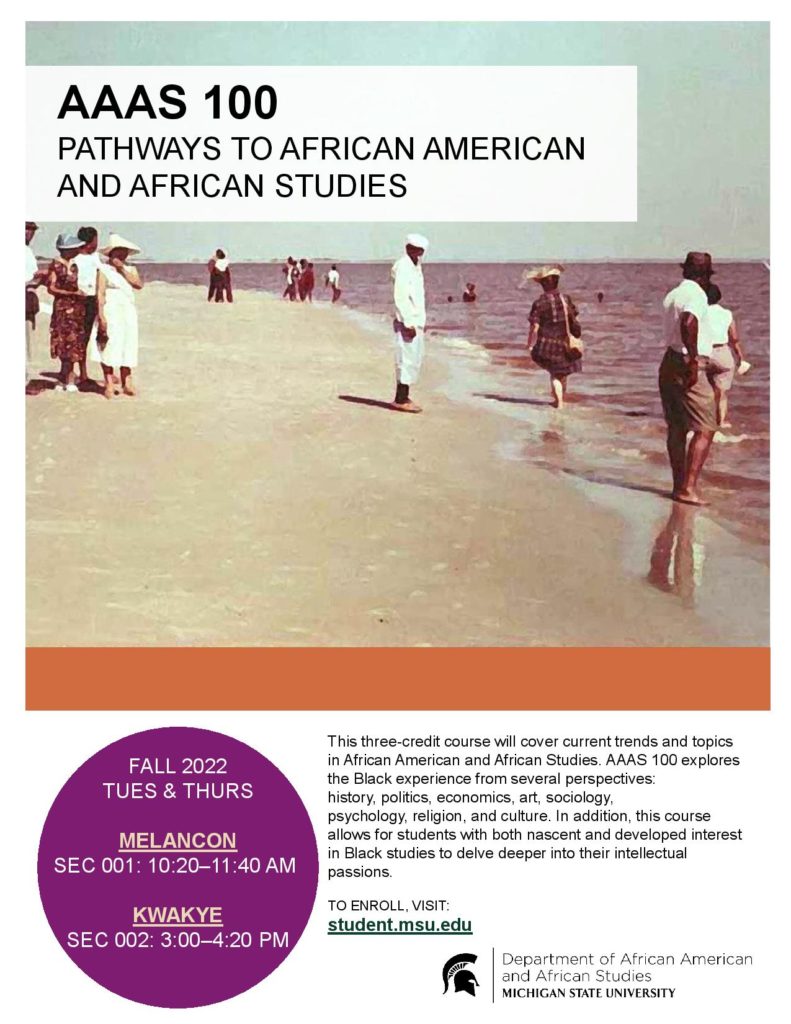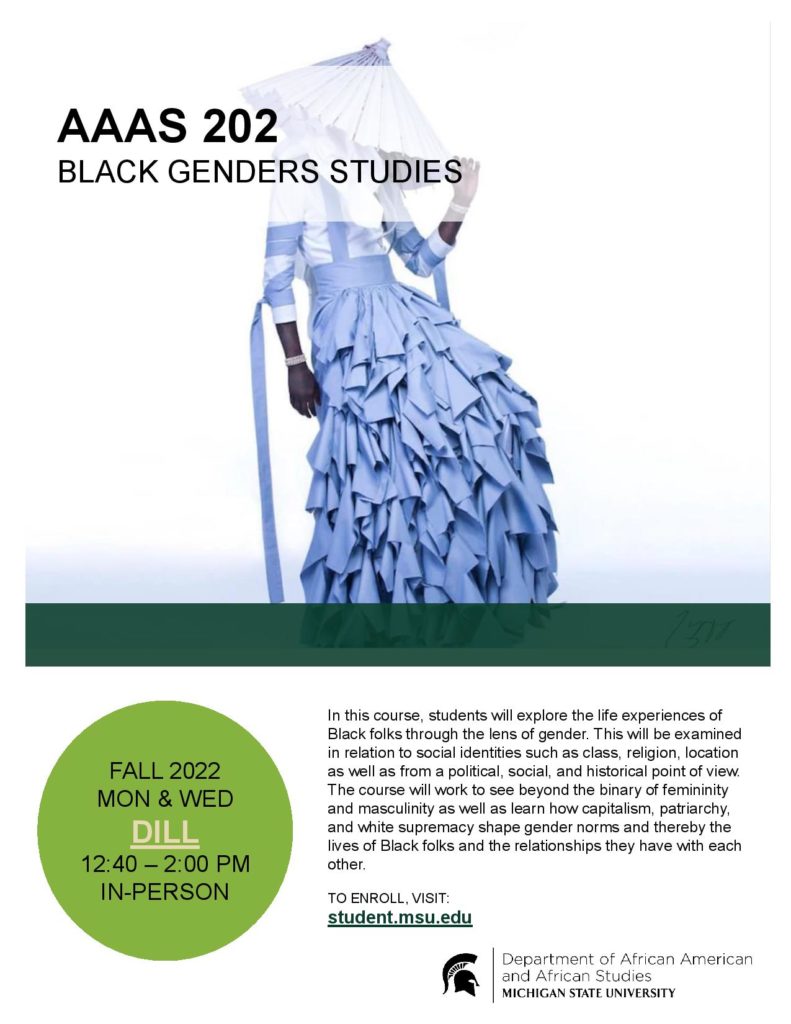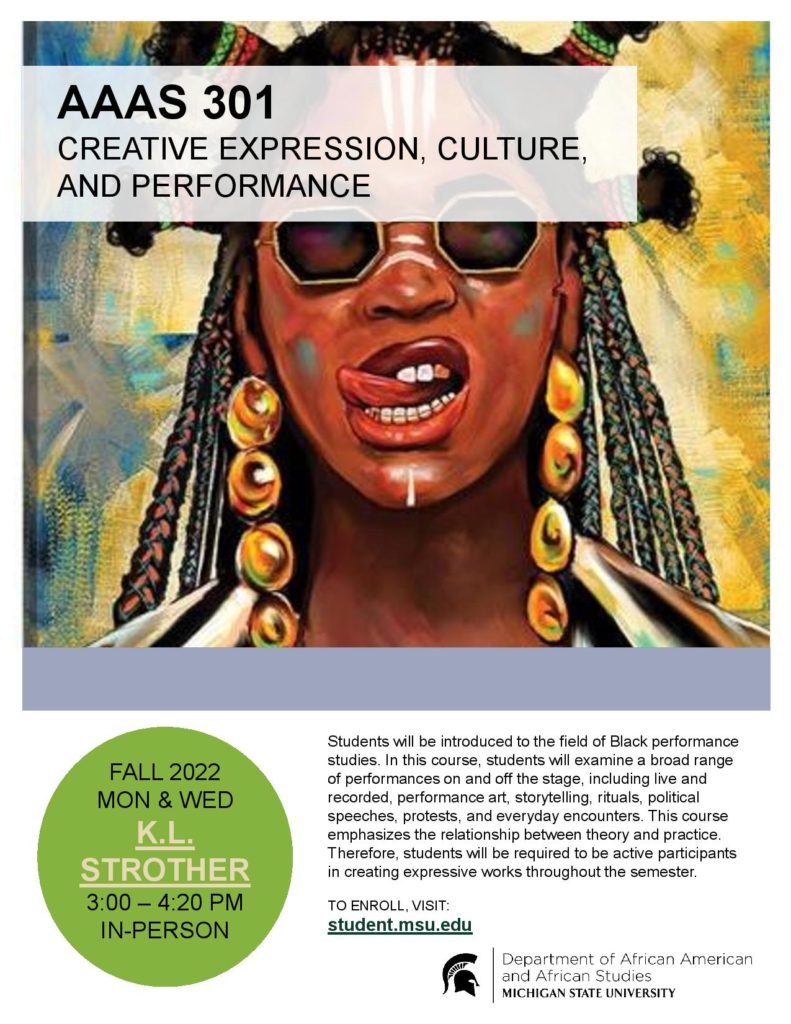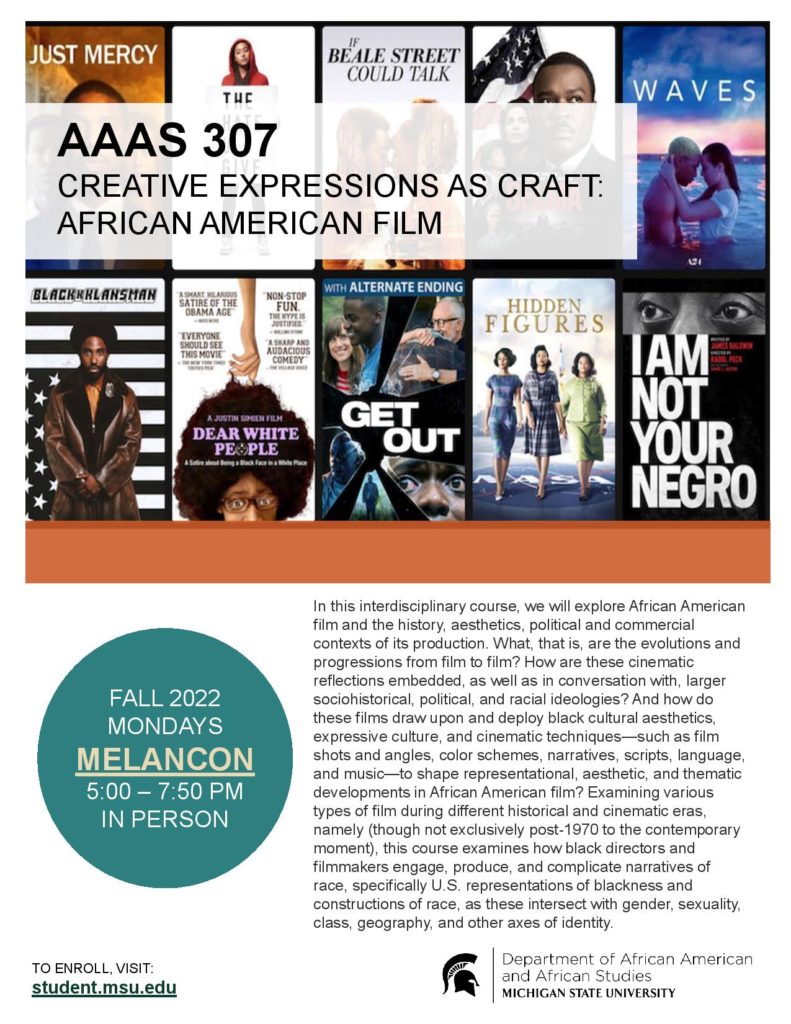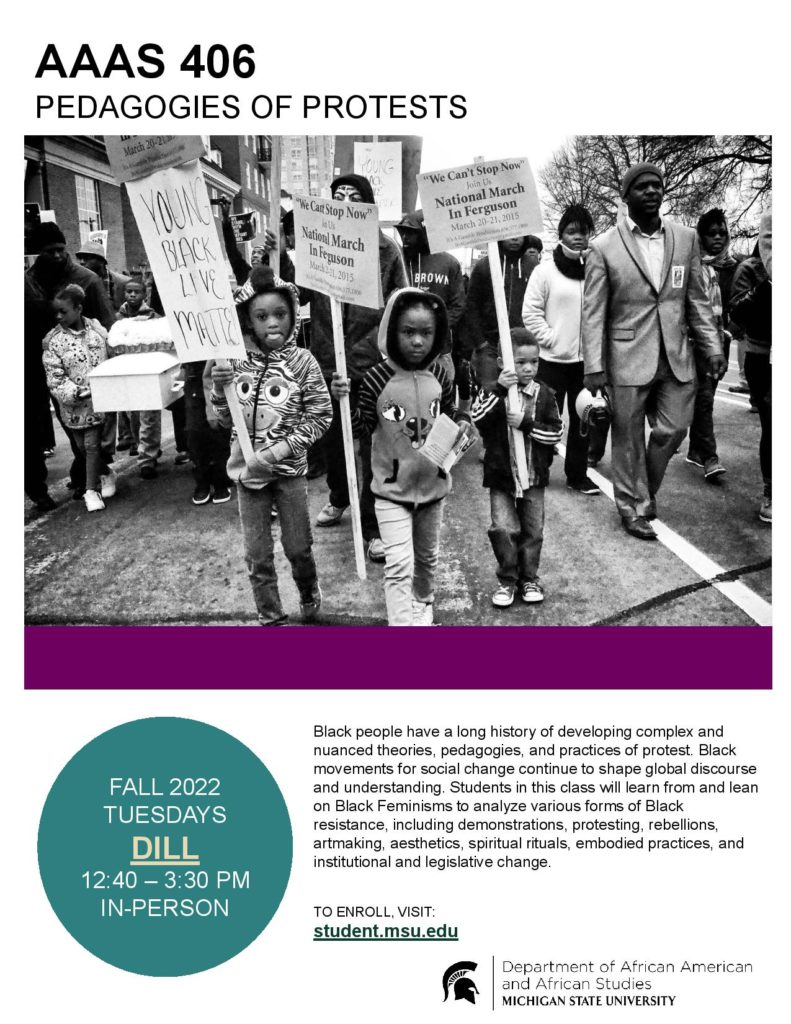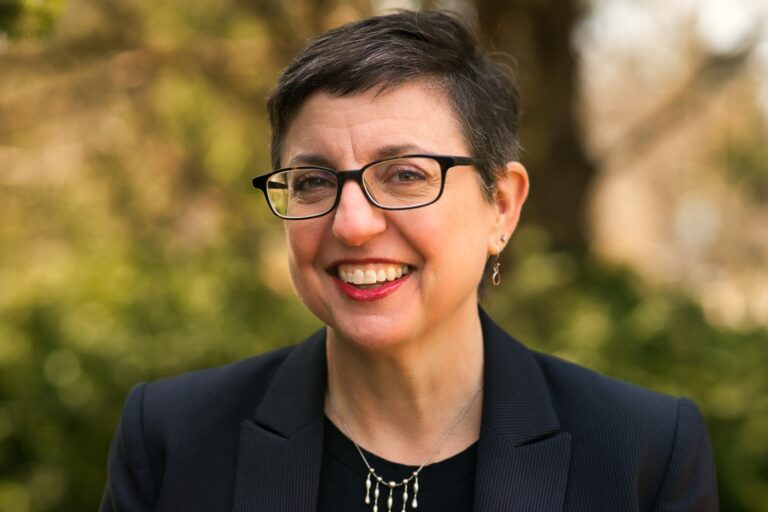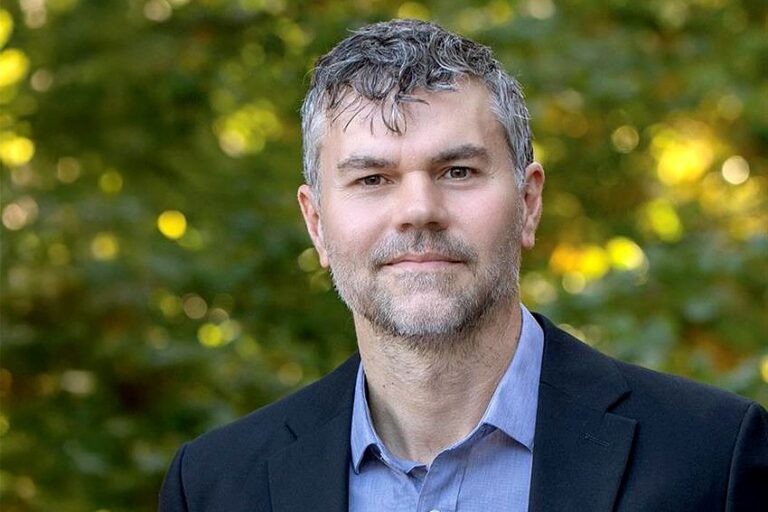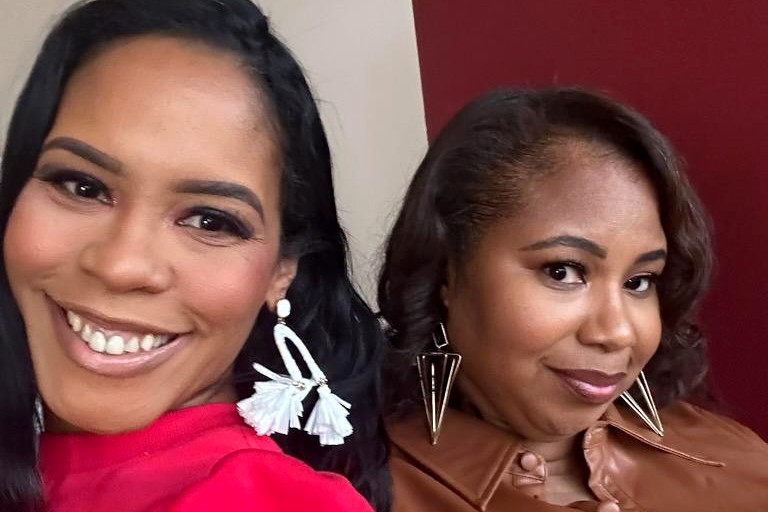Michigan State University’s Department of African American and African Studies (AAAS) continues its upward trajectory with the addition of five new or revised courses for the Fall 2022 semester.
The courses offer contemporary perspectives and innovative curriculum within the evolving discipline of Black Studies. Each course highlights the department’s focus on Black Feminisms, Black Gender Studies, and Black Sexualities Studies while inviting students to engage their imaginations and create change.

“The classroom, as facilitated by our amazing faculty, is an electric space where students can ask questions and consider new ideas they may have never thought of before,” said Ruth Nicole Brown, Professor and Inaugural Chairperson of the AAAS Department. “Courses are the heartbeat of the Department of AAAS. Students are our greatest ‘why’ for what we do.”
Brown said the new courses, or any course offered by AAAS, are a great way for MSU students to get acquainted with Black Studies, engage with the department, and learn from and with dynamic and transdisciplinary AAAS faculty, many of whom joined MSU this past academic year in Fall 2021.
“The way we are thinking about our courses and students is not only to meet this moment in time, but to create a foundation for generations ahead.”
Ruth Nicole Brown, Inaugural Chairperson of AAAS Department
“The way we are thinking about our courses and students is not only to meet this moment in time, but to create a foundation for generations ahead. Now that MSU students can major in AAAS, we are excited about their involvement in shaping the department and working together to facilitate additional practices of Black joy, wellbeing, and community building on and off campus,” Brown said. “Integrating students’ scholarly interest with activism, social justice, and the arts is integral to our approach in AAAS.”
All new and revised courses will apply to the new Bachelor of Arts degree in African American and African Studies launched this past spring. The following includes more information on the new or revised AAAS classes being offered in Fall 2022 and the faculty who will teach them:
Pathways to African American and African Studies (AAAS 100)
This foundational three-credit class will be taught a little differently this fall while continuing to cover current trends and topics in African American and African Studies. Students of the Pathways to African American and African Studies class will explore the Black experience from the perspectives of history, politics, economics, art, sociology, psychology, religion, and culture, and in doing so, will discover ways to delve deeper into their intellectual passions and to think deeper about the world.
Scholar-artist and AAAS Advisor, Chamara Jewel Kwakye, will teach one section of AAAS 100 and Professor Trimiko Melancon will teach the other section this fall.
“Our students can expect to learn that being in and seeing yourself as part of a community is important to our survival and wellness,” Kwakye said. “They will also realize there is no scarcity of resources ready to help them do their best, including resources that exist in themselves, their peers, on campus, and beyond.”

The redesigned course looks to appeal to students who are new to college, new to MSU, and new to the AAAS discipline where they will learn about historical events they probably were not taught in K-12 curriculum.
“In my two semesters at MSU and teaching AAAS, students have often told me that this is the first time they’ve directly engaged Black feminism in a college course,” Kwakye said. “They’ve also said they appreciate having our class consistently and purposefully consider the intersections of race, class, gender, sexuality, and ability in the African diaspora.”
Black Genders Studies (AAAS 202)
Black Genders Studies is one of the introductory and foundational courses in AAAS. Students of this three-credit course will examine gender beyond the binary of feminine and masculine and explore the life experience of Black people through the lens of gender.
Associate Professor LeConté Dill will teach the class. She said she is excited to learn from and contribute to an innovative, rigorous, and expansive model of Black genders studies created by her AAAS colleague and AAAS Advisor, Yvonne Morris.
“As we continue to build anew in AAAS, we also honor taking important lessons, frameworks, and models with us as we shift and grow,” Dill said. “I look forward to amplifying multi-genre arts, artists, and aesthetics as critical lenses to explore and imagine the norms, identities, expressions, resistance, and fluidity of Black genders.”
Students also will learn how capitalism, patriarchy, and white supremacy shape gender norms, and subsequently, the relationships Black people have with one another.

Creative Expression, Culture, and Performance (AAAS 301)
Offered for the first time in Spring 2022, the Creative Expression, Culture, and Performance course invites students to engage their “whole selves” by participating as facilitators, cultural workers, change makers, emerging scholars, and cultural producers.
Students of this three-credit course will examine a broad range of performances on and off the stage, including live and recorded performance art, storytelling, rituals, political speeches, protests, and everyday encounters.
Assistant Professor Gianina K.L. Strother, who will teach the class, said that since the course emphasizes the relationship between theory and practice, students will be required to be active participants in creating expressive works throughout the semester.

“What I love most about the arts is how it can serve as an agent for social change,” said K.L. Strother. “This course provides an opportunity for students to use the performing arts as a critical lens to interrogate current and past issues of social justice so they can continue, or be empowered, to contribute to a more just and equitable society.”
Students can expect to learn how the performing arts are used as a tool to help Black folks understand, challenge, and transform their current conditions.
Creative Expressions as Craft: African American Film (AAAS 307)
Students will explore African American film and the history, aesthetics, political, and commercial contexts of its production through the Creative Expressions as Craft: African American Film class, which was offered for the first time in Spring 2022.
A key focus of this three-credit course is the evolutions and progression from film to film and how cinematic reflections are embedded with larger sociohistorical, political, and racial ideologies. Students will explore how films draw upon and deploy Black cultural aesthetics, expressive culture, and cinematic techniques to shape representational, aesthetic, and thematic developments in African American film.
Professor Trimiko Melancon, who teaches the course, said it will enhance students’ analytical and critical reading, thinking, and interpretive skills and improve their ability to analyze cinematic and cultural texts. Students will historicize and situate African American films within larger social, cultural, political, and aesthetic contexts and better understand how African American cinema and filmmaking have evolved.

“The goal is for students to gain a fuller, richer understanding of African American film as it relates to the American literary and cultural imagination,” Melancon said. “Students will also see how African American film has influenced cultural expression and production as well as artistic, aesthetic, and intellectual movements in the U.S.”
The course will examine various types of films from different eras. Students will delve into how Black directors and filmmakers engage, produce, and complicate narratives of race and their intersection with gender, sexuality, class, geography, and other aspects of identity.
Pedagogies of Protests (AAAS 406)
Pedagogies of Protests explores past, present, and future models and movements of Black liberation and social change. This new course delves into the long history that Black people have in developing complex and nuanced theories, pedagogies, and practices of protest and examines how Black movements for social change continue to shape global discourse and understanding.
Students will lean on Black feminisms to analyze various forms of Black resistance, including demonstrations, protesting, rebellions, artmaking, aesthetics, spiritual rituals, embodied practices, and institutional and legislative change.
“We will examine oppressive systems that have led to protests and rebellions while amplifying the self-determined narratives of unsung leaders, organizers, and everyday folk.”
LeConté Dill, Associate Professor
Associate Professor LeConté Dill, who will teach the class, said she looks forward to centering on the teachings and learnings of Black activism through a Black feminists lens.
“We will examine oppressive systems that have led to protests and rebellions while amplifying the self-determined narratives of unsung leaders, organizers, and everyday folk,” Dill said. “Importantly, we will also learn, offer, and practice the individual and collective healing rituals that have always been part of justice commitments.”
